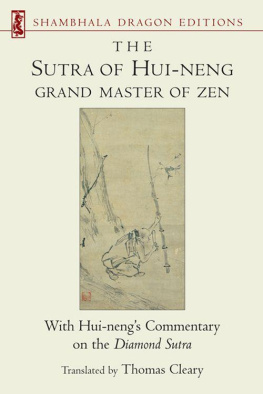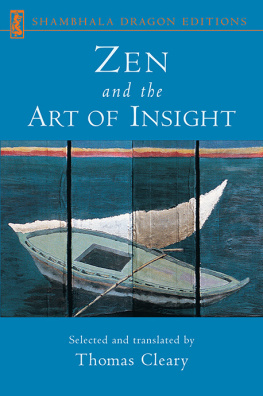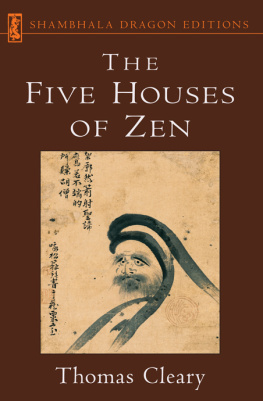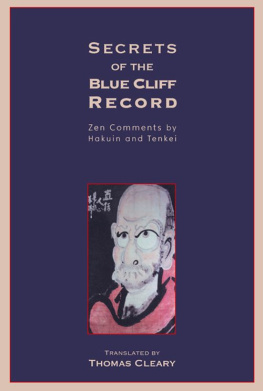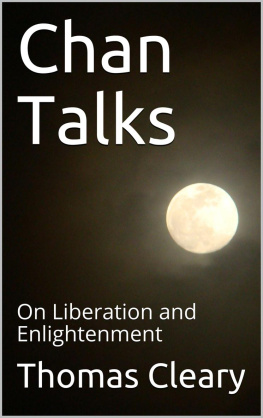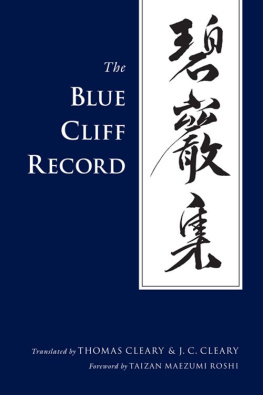Thomas Cleary - The Empty Valley Collection: volume one
Here you can read online Thomas Cleary - The Empty Valley Collection: volume one full text of the book (entire story) in english for free. Download pdf and epub, get meaning, cover and reviews about this ebook. year: 2016, genre: Children. Description of the work, (preface) as well as reviews are available. Best literature library LitArk.com created for fans of good reading and offers a wide selection of genres:
Romance novel
Science fiction
Adventure
Detective
Science
History
Home and family
Prose
Art
Politics
Computer
Non-fiction
Religion
Business
Children
Humor
Choose a favorite category and find really read worthwhile books. Enjoy immersion in the world of imagination, feel the emotions of the characters or learn something new for yourself, make an fascinating discovery.

- Book:The Empty Valley Collection: volume one
- Author:
- Genre:
- Year:2016
- Rating:3 / 5
- Favourites:Add to favourites
- Your mark:
- 60
- 1
- 2
- 3
- 4
- 5
The Empty Valley Collection: volume one: summary, description and annotation
We offer to read an annotation, description, summary or preface (depends on what the author of the book "The Empty Valley Collection: volume one" wrote himself). If you haven't found the necessary information about the book — write in the comments, we will try to find it.
The Empty Valley Collection: volume one — read online for free the complete book (whole text) full work
Below is the text of the book, divided by pages. System saving the place of the last page read, allows you to conveniently read the book "The Empty Valley Collection: volume one" online for free, without having to search again every time where you left off. Put a bookmark, and you can go to the page where you finished reading at any time.
Font size:
Interval:
Bookmark:
The Empty Valley Collection
Volume One
Translators Introduction
The Empty Valley Collection is a Chan Buddhist sourcebook composed on the model of the famous classics Blue Cliff Record and Book of Serenity. It contains Chan stories selected by the distinguished 11 th century master Touzi Yiqing, with commentaries by Touzi himself and Linquan Conglin, an outstanding Chan master of the 13 th century.
Chan stories illustrate principles and practices of Buddhism, and are used to focus attention in particular ways to foster specific mental postures and structure concentration exercises. Their special virtue lies in enabling the mind to evoke, examine, and enter into the corresponding principles and practices without the mediation of linear thought, thereby to assist in awakening direct perception and intimate experience of the aim.
Touzi Yiqing is particularly noted for having been specially chosen to receive and transmit the methods of the Cao Dong school of Chan after the passing of the last master of that lineage. Besides the core of the Empty Valley Collection, his writings include another anthology of one hundred Chan cases, and a unique commentary on the first classic of Chan Buddhism, Poem on Faith in Mind , attributed to the third patriarch of Chan in China. In the Empty Valley Collection , Touzis commentary is chiefly in poetry, depicting the essential design of each story in elegant symbolic verse. Occasionally he also adds some remarks in prose.
Linquan Conglin was a principal successor of the great Cao Dong Chan master Wansong, author of the prose commentaries in the Book of Serenity. Linquans commentaries in the Empty Valley Collection follow the pattern of the Book of Serenity and the Blue Cliff Record, with brief introductions setting the stage for each story, typically alluding to the central point, interlinear remarks inserted into each story and Touzis verse on it, and finally longer prose commentaries on each story and verse. Linquans remarks contain many hints for application in practice, as well as counterpoints to forestall fixation on particular positions or stages of understanding.
1. Stages
Introduction
To utterly forget the human world, whats the need to think thrice? To smash a mass of doubt, how does it take a single statement? Who is it that does not linger in the mystic pass but finds the subtle everywhere?
Citation
Master Si asked the Sixth Grand Master, What must be done in order to be able not to fall into stages?
If you just do good things, whats the need to ask about the future?
The grand master said, What have you done?
He rips open his gut and tears out his heart.
Si said, I dont even do the holy truths.
A single grain of alchemical elixir transmutes iron into gold.
The grand master said, What stage do you fall into?
To extend a hand, he doesnt spare his dignity.
Si said, If even the holy truths are undone, what stages are there to fall into?
When youre deluded, the three realms exist; when youre enlightened, the ten directions are empty.
The grand master said, So true, so true. (Pitying a child, he doesnt mind being unseemly) Keep it carefully. I will put it in verse: (Lets hear the quintessence of the teaching)
The ground of mind contains seeds:
All are within.
When it rains everywhere, they all sprout.
All phenomena are born from conditions.
When suddenly enlightened, fancy feelings cease:
And do not produce branches or draw out vines.
The fruit of enlightenment matures of itself.
You should know that sweetness comes out of bitterness.
Commentary
Cultivation is gradual, and always has been. Sharp and dull faculties cannot be equated. Starting from vision, application, and unlearning, up to warming, peaking, tolerance, top of the world, and two awakenings, equivalent and subtle, none are beyond mysticism constructed for development.
Furthermore, even to divulge everywhere in response to mature minds, developing the body of wisdom, awakening independently, immediately realizing enlightenment at the moment of initial inspiration, upon close examination only expresses a half.
When you get like the Buddha never emerged in the world, and there is no nirvana, this is just eighty percent.
How would a hundred percent be expressed? Mouthy monks cannot quote it; a wordless child skillfully sets it forth.
Master Rang of Nanyue once told Great Master Ma, Your study of the teaching of the ground of mind is like planting seeds. My exposition of the essentials of the teaching is like moisture from the sky. Conditions are meet for you, so you will see the path.
Indeed, these seeds are in everyone, without exception; be careful not to turn away from your own spirituality and bury your family treasure. Having gotten the seat and donned the garment, afterwards see for yourself.
Although this speech of mine may be shallow, dont you get high and mighty.
If you have seen the unseen, you still need to make sure by questioning Touzi.
Verse :
The invisible peak exposed, the gathering of the clouds is swift.
If you gaze at it, youll go blind.
The spiritual branch beyond time isnt imbued with spring.
Where the sun, moon, and stars dont shine, there is a distinctly better realm of thought.
On the Other Side, he doesnt sit in the royal palace of emptiness;
He cannot be kept in the land of no impulse.
How could he consent to plow the fields in the sun?
It must be hard to see in the moonlight.
Commentary
The Flower Ornament Scripture says, Just as space is all-pervasive, where there is matter and where there is none, neither reaching nor not reaching, because space is bodiless, so also is the body of the Realized One, pervading everywhere, in all living beings, in all phenomena, in all lands. Why? Because the body of the Realized One is bodiless; it is for the sake of living beings that it manifests physically. But what about the invisible peak exposed? How do you find it?
Where you hurriedly set your eyes in the mists of clouds of impulsion, overcast with the fog of ignorance, you are all the more out of touch. How much the more of the time before the eon of emptiness, when the branches of the spirit bloom spontaneously, not dependent on the root of intellect; why would it await warm weather for evaluation?
The fact is that the fundamentally faceless fellow is detached from subjective assessments of gain and loss, and has left conventional concepts of escape and immersion. Neither sages nor ordinary people can fathom him; order cannot restrain him. He is unfailingly free and at ease, peaceful and calm.
Even so, he still does not escape Nanquans saying, Even the prehistoric Buddhas are my descendants. What does this mean? Since ancient times, lawgiving monarchs have had all their grit; without showing the royal seal they were naturally respected.
2. Not Only Caoqi
Introduction
Distinguishing old and young, beautiful and ugly, a mirror can hardly be fooled. For weighing light and heavy, to figure out a price, low or high, nothing is better than a scale. Once you know half a pound in the left eye, you expect to see eight ounces in the right eye.
If anyone doesnt believe, try to make a through examination:
Citation
Shitou came to Master Sis place.
Not an easy trip.
Si asked, Where are you coming from?
Analyze the soil by what grows in it.
Shitou said, Ive come from Caoqi.
Much falsehood is not as good as a little truth.
Si then held up a fly whisk and said, In Caoqi, is there this ?
Hes making good conversation.
Shitou said, Not just Caoqi; its not even in India.
He avoids direct confrontation.
Si said, You havent been to India, have you?
Next pageFont size:
Interval:
Bookmark:
Similar books «The Empty Valley Collection: volume one»
Look at similar books to The Empty Valley Collection: volume one. We have selected literature similar in name and meaning in the hope of providing readers with more options to find new, interesting, not yet read works.
Discussion, reviews of the book The Empty Valley Collection: volume one and just readers' own opinions. Leave your comments, write what you think about the work, its meaning or the main characters. Specify what exactly you liked and what you didn't like, and why you think so.

